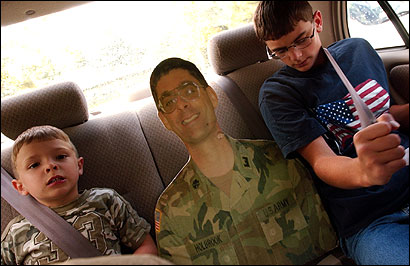by Joe Carpenter
November 2, 2005
But the proles, if only they could somehow become conscious of their own strength, would have no reason to conspire. They needed only to rise up and shake themselves, like a horse shaking off flies. If they chose, they could blow the party to pieces tomorrow morning. Surely, sooner or later, it must occur to them to do it? And yet . . .
-- George Orwell, 1984
I've never understood the idea of speaking truth to power. The truth, surely, is that in almost all countries of the world, political and economic systems are designed to benefit only the rich and powerful, at the expense of those with less money and power. This is how the world works, and I see no reason to think that the powerful don't already understand that. After all, they designed it; they maintain it. They steal our money, sacrifice our children in their wars, send the poorest and most victimized among us off to jail for petty mistakes, and crush those of us who might present a real threat to the arrangement.
They know we don't like it. They don't care. They don't need to care. They also control most of our avenues of dissent. It's a very simple, very elegant design. Meanwhile, we get angry and toddle off to tell the truth to the powerful. We have been telling them the truth for centuries. We travel to their great palaces by the hundreds of thousands, to express our anger and despair. We shout and sing and stomp and whine. We threaten. We plead. Sometimes we're beaten up, or sent to jail. It's a tradition of great courage and personal sacrifice, no doubt.
We go to tell them to stop using our money and our children and our energy and intelligence to further rob and rape and murder us. We tell them to be more respectful and compassionate. We¹re like angry but terrorized children, anxiously scolding our stern, all-powerful parents. And, in the end, we look to the Democrats or to some congressional panel or to the Supreme Court and demand that they come to our aid. As my friend Harry puts it: We¹re left in the terrible position of trying to decide which elite group will be less likely to prey on us.
Well, the government and their pals are not going to stop using and abusing us. They're not going to stop preying on us. They cannot stop! Republican or Democrat, they are rich and powerful precisely because they prey on us. They are rich because they rob us. They're robbing us right this minute. They are powerful because they dominate every aspect of our lives, because they've taken control of all the major social, political, economic, and communication systems in the world. These systems were designed to increase their wealth and power by taking both from all the rest of us.
But, we are not children, and they are not our parents. We're not little people and they are not big people. We're not insignificant and they are not significant. In fact, we do not need them. They are very few and we, here in the US alone, are roughly 300 million. We don't need to rush out to tell the few that they are abusing the many. They already know that. We need to stand upright and walk out to tell the many that they are being slowly devoured by the few, for -- incredibly, they do not know.

We need to look to our next door neighbors, and to their next door neighbors and to the folks all along the block. We need to tell the truth to each other -- for we are the answer. While hundreds of thousands of anti-war demonstrators gathered in Washington, DC, back in September, hundreds of millions of American citizens went about their business without even a vague awareness of the protests. The media to which most of them attend barely mention such things -- obviously. And, most Americans don't live in the DC area, so they didn't see a thing.
Most Americans live in my neighborhood, or in your neighborhood. Most Americans eat breakfast right next to you in the local café. Most Americans get their car fixed at the same garage as you and I do. Most Americans visit my library, my bookstore, my grocery store, my local park -- or yours. But the rich and powerful have convinced us that we cannot -- we must not -- communicate with the people we can see and hear and touch, right here, right now.
They have convinced us that we need to travel to some government office to persuade elected officials and bureaucrats to change our world for us. The government and media drone on, endlessly, hypnotically, and convince us that if we just elect the right leaders, they'll talk to our next door neighbor for us. Government programs, they promise us, will fix that gaping hole in the pavement right out beyond your driveway. Government will help poor Mrs. Wilson, languishing in the old, dilapidated house right across the street. Government will settle your dispute with that family right down the block. Government will take care of your neighbors who can't escape the hurricane: It's OK, just hop in the SUV and go, we¹ll take care of everything! Government will help; government will heal; government will bring us together.
That's not going to happen, of course. The elites are too busy dividing us, setting us against each other, exacerbating every animosity, every misgiving, every anxiety, however slight. They insinuate themselves into every new crack and crevice and offer convoluted, expensive legislation and bureaucracies to bring us back together again. There oughta be a law, says the old complaint. Well, there will be, to be sure -- but it will just make things worse.
We're all looking in the wrong place for reason and compassion and justice. It's not anywhere to be found in Washington, DC. It's not in governments or state houses. It's not there in that prestigious gathering of experts and big brains. It's right here. It's wherever you are, and it's right next door and it's everywhere along your street and all around your neighborhood. It¹s in the cars that pass you on the roadways and in the shops where you buy your dog or cat food. There's no need to travel a thousand or even a hundred miles. It¹s not necessary to make the climb up to the penthouse. Our hope, our possibility -- our only hope, our only possibility, lies in the ordinary people who compose our world, who are the very stuff of our lives.
Want to change the world? Tell the truth to the plumber. Begin with the lady who hands you the stamps at the post office. Talk with the checkout people at the grocery store. Chat with the waiter at your favorite café. Speak with the cops who sit down at the next table. Gab for a few minutes with the guy who changes your oil or with the elementary school teacher with whom you¹ve been discussing your child's future. Lean out of your window while stopped at the light and tell the truck driver some truth he's certain to recall and ponder.
Feel the need to march? Gather a bunch of folks and wander about your neighborhoods with signs and leaflets. When people walk by, stop and gab with them. When that huge guy with the Hemi-powered Ram pulls alongside and tells you to "love it or leave it," ask him to stay and talk. Smile, offer your hand, make nice. He's one of us. He'd make a wonderful ally. When a carload of high school jocks slows to offer some single-fingered communication, hand them some cold colas and tell them about the probability of a draft. They're our people, too. Convince yourself that this is so, then convince them.
Get together with like-minded people and think of simple, brief, meaningful ways to communicate with the folks all around you. Think about little things, easy things, immediate things. Think about what you can do together, and what you might accomplish alone. Think about your real day-to-day life, and how many opportunities there are to educate and enlighten, every day. Blab and babble and blunder and tell the truth, one ordinary person at a time.
We're all ordinary people, and we are our only hope. Tell the truth to the guy who pumps out the septic tank -- he's one of us! Forget about telling the government, forget about the hot shots. To the extent that we believe we need them, exactly to that extent will we continue our dependence upon ruthless, murderous plunderers, people entirely opposed to our needs and deepest longings. As long as we believe we need them, exactly that long will we live life on our knees, begging -- as Mickey Z. says -- for crumbs from their table.
The depth of our apparent need is the measure of their height above us. The nightmare of our poverty is our dream that they have a right to take our money. The illusion of our impotence is the chimera of their monstrous strength. We shall be slaves as long as we're convinced that we have masters, and not one moment longer. Time to wake up, time to grow up. We're not children.
We do not need to ask permission to live like sane, reasonable, thoughtful, compassionate human beings. We do not need to beg or bow or kneel. We do not need to look to government or to experts or to the rich and famous. Whatever we need, we can get it ourselves. Whatever we want to stop -- we can stop it ourselves. Whatever must be done, we can do it ourselves. We do not need them; we need each other. All else is distraction and delusion.
Joe Carpenter is a guy living in Southern Oregon who has traveled extensively and kept his eyes open. He can be reached at: joecarpenter[at]charter.net




